Ithryss A. Mild Tolkien and Star Wars obsession. Chronically sleep-deprived college student.
Don't wanna be here? Send us removal request.
Video
An Unhelpful Guide to the Silmarillion
This was inspired by all of the unhelpful guides to Kpop groups, I hope this is as fun to watch as it was to make
4K notes
·
View notes
Text
Hello I’m here to talk about an opinion that isn’t so much unpopular because people don’t like it, but because it is splitting hairs and basically an argument based in semantics that sane people reasonably do not waste their time caring about it.
I am neither sane nor reasonable and therefore think about this a lot, and get ready to pull out a soapbox and type the Text Wall of China any time I hear people offhandedly contradict this opinion, and so I have come here today to die on this molehill, and write the over-long post of my dreams, because fuck it, it’s my blog.
Drumroll please:
Sauron is not The Lord of the Rings
The Lord of the Rings is the main antagonist though, so furthermore,
Sauron is not the main antagonist of The Lord of the Rings
I internally go insane every time someone says “Sauron, the eponymous Lord of the Rings” or “The antagonist never actually appears in Lord of the Rings” or uses Lord of the Rings as an penultimate example of having a flat ‘evil for evil’s sake’ villain. This is mostly in YouTube videos so I’m not calling out anyone here.
So who is the Lord of the Rings? Where do I get this shit? Why should anyone care?
I will tell you in far too much detail under this cut, because I told you I was gonna be extra about it and this is already long enough to inflict on my followers without their consent.
First and foremost, Frodo is not the Lord of the Rings either. Let’s get that out of the way. Gandalf explicitly tells us that in Many Meetings (the first chapter in Rivendell in Fellowship), when Pippin greets a newly awakened Frodo with quintessential Fool of a Took™️ swagger.
‘Hurray!’ cried Pippin, springing up. ‘Here is our noble cousin! Make way for Frodo, Lord of the Ring!’
‘Hush!’ Said Gandalf from the shadows at the back of the porch. ‘Evil things do not come into this valley; but all the same we should not name them. The Lord of the Ring is not Frodo, but the master of the Dark Tower of Mordor, whose power is again stretching out over the world! We are sitting in a fortress. Outside it is getting dark.’
So that’s my theory busted right off the bat! Gandalf straight up tells us the Lord of the Ring is Sauron (‘the master of the Dark Tower of Mordor’ which is Sauron).
But I already told you, this is a hair-splitting semantics-based theory! He said Sauron was the Lord of the Ring. Not the Lord of the RingS. Yes, this whole theory revolves around a single letter difference between the title of the series and Gandalf’s statement, WHAT OF IT?
But in all seriousness. Tolkien was a linguist. There was no way this choice was not deliberate, not on something so important to the narrative. And there is a very important difference between what he is referring to when he uses ‘The Ring” singular, and “The Rings” plural. The Ring that Frodo carried to Mordor has it’s singular nature highly emphasized by the language that surrounds it. THE definite article Ring, the ONE Ring. Just the One. Singular Singular Singular.
The Rings (plural) refers to the rings of power which Celebrimbor wrought, with Sauron’s help, but Sauron is objectively not the Lord of those rings. Not the three Elven ones at least, which he never touched and only suspects the location of. Without his One Ring he has no power over the Three, and a big problem with him regaining his Ring is that he would gain power over those rings, the ringbearers, and the safe realms that had been wrought with them, basically crippling those with the power to resist him.
Him NOT having the Ring, and therefore NOT having lordship over all the rings, is a pretty major plot point. Like, it’s not a reach to say Sauron not having the Ring is what drives the entire story. And he is NOT the Lord of the Rings without it.
And he never gains it, so is the whole series named after Sauron’s aspirations, that the main characters are trying to prevent? I mean, from an angle yes. But also no.
Because while Pippin and Gandalf’s exchange is the closest we come in the text to seeing the title, let me show you the only place within the covers that “The Lord of the Rings” is presented, at least in my beat up third hand 70’s edition. It may not be formatted like this in other editions, but I still think it says something about how we are supposed to read the title:

[Image ID: Masking tape can clearly be seen holding together my poor abused copy of Fellowship, open to the title page. THE LORD OF THE RINGS is written across the top of the page in all caps, directly below it is the Ring Poem, as if The Lord of the Rings is a the title not only of the series but of the poem. /.End ID]
The One Ring is the Lord of the Rings, not Sauron, who is the Lord of the Ring.
“What?” Say imaginary naysayers in my head, “How can a Ring be a Lord? And why does this matter, if Sauron is the Lord of the Ring, doesn’t that make him the Lord of the Rings by proxy? Why are you wasting your and my time making an argument about this?”
I’m glad you asked imaginary naysayer, let me speak to your first point. How can a ring be a Lord? Well, like any good first time speechwriter, I’ve turned to Miriam Webster, and asked it to define a word we already know, in this case ‘lord.’

[Image ID: Screenshot of the Miriam Webster definition of ‘lord.’ The ones that are relevant are 1: One having power and authority over others. 1a: A ruler by hereditary right or preeminence to whom service and obedience are due. And 1f: One that has achieved mastery or that exercises leadership or great power in some area /.End ID]
In the poem, it is the Ring that is spoken of as ruling, not Sauron. Sauron is actually listed in the same position as all the others who receive rings, “The Dark Lord on his Dark Throne” occupying the same place in the sentence structure as the “the Elven-kings under the sky” and “the Dwarf-lords in their halls of stone” and “Mortal Men doomed to die.” It is the One Ring, not Sauron, who rules them all, fulfilling our first definition “A ruler by hereditary right or preeminence.” In this case it would be by right of preeminence, or superiority. The One Ring outclasses the other rings and thus dominates them, binding them to obedience and service. Gandalf calls it “the Master-Ring” when it is first revealed for what it is in Bag-End with the words appearing from the flame.
The Ring has it’s own will too. It’s repeatedly stated to be in control of Gollum when Gandalf is first telling us about it. I’m literally so spoiled for quotes about this that I was paralyzed with indecisiveness over what to use but let’s keep it simple with this one. It’s from Gandalf explaining why Gollum didn’t have the Ring allowing Bilbo to come upon it in the chapter “Shadows of the Past” from Fellowship:
‘It was not Gollum, Frodo, but the Ring itself that decided things. The Ring left him.’
So if Sauron is the Lord of the Ring, and the Ring is the Lord of the Rings, isn’t he Lord of the Rings by proxy? Yes, when he has the Ring. But also being the ruler of a lord doesn’t make the title of that lord your title, if that makes sense. People don’t call Aragorn the Prince of Ithilien, that’s Faramir’s title, Aragorn is King of the Reunited Kingdoms, he rules Ithilien, sure, but by proxy. Ithilien reports to Faramir who reports to Aragorn (I should be calling him Elessar since I’m talking about him as king, but whatever). If Aragorn lost the ability to contact Faramir or Ithilian, he would still theoretically be king there but he would have no practical control, just like Sauron with the Rings of Power.
Why does this matter? It mostly doesn’t. It does not change anything practically in the story at all.
But it matters to me, because it might help change perspective on the antagonist of LotR. It’s the Ring. Sauron is a force in the world, one the Ring is closely allied with, and from whom many of the obstacles come, but the entity that our protagonist is really fighting on every page is the Ring.
If Gandalf were the main character, or Aragorn, or almost anyone else on Middle Earth, Sauron would be the Primary Antagonist. But they are not. Frodo is the Primary Protagonist, and his struggle is NOT against Sauron, it is against the Ring.
If destroying the Ring had not destroyed Sauron, would Frodo have kept fighting in this war? NO! He had his task, and once it was done he was done, even if the world ended afterwards. Everything is driven by the Ring. The threat to the Shire comes from the presence of the Ring, so Frodo takes the Ring to Rivendell. The danger of the Ring is not neutralized by it being brought to Rivendell, so he continues his journey to destroy it once and for all. He doesn’t fight Sauron, he fights the Ring. He fights with himself to keep going in spite of the despair it levels on him, the poisonous words it whispers in his ear, the physical toll it takes on his body. He fights Boromir and Sam (not to the extent he does in the movie, but still a bit) and Gollum over the Ring. He negotiates with Faramir over the Ring.
And the Ring is SUCH a more interesting and nuanced villain to struggle with than Sauron. Sauron is representative of a force in the world. He controls events but never appears, because he acts as the source of all evil, it’s representation on earth (at least now Melkor is in the Void), but it is far more interesting to watch the effect he has on others than deal directly with a character that is so obviously in the wrong in every way. Making Sauron a physical character in LotR is like making the Devil a present character in basically any piece of media that deals with evil.
Evil at its purest isn’t that interesting, because it contains no conflict. Leaving Sauron as an offscreen player leaves us to see characters that are not pure evil struggle with that conflict.
The fascinating thing about the Ring is that it has no power outside of what you give it. But given enough time even the best people, like Frodo, will end up losing themselves to it, as it whispers in your ear with your own voice.
I want to go ballistic when people point to LotR and say it has a one dimensional villain. EVERYONE’S OWN VIOLENCE, DESPAIR AND THIRST FOR POWER IS THE VILLAIN OF LORD OF THE RINGS! Brought to the fore by a small unassuming golden trinket which just happens to also be the titular Lord of the Rings.
Honestly “The Ring is the Villain of LotR change my mind” should be its own big long post with lots of quotes and shit, the fact that the Ring is The Lord of the Rings just being a small point in it.
But unless you are a specific type of interested in story structure and stuff none of this is at all meaningful and it really, really doesn’t matter, so I’m gonna go.
Thanks for coming with me on this dumb journey.
8K notes
·
View notes
Text
I love post-Thangorodrim whump & hurt/comfort as much as, maybe more than the next girl, but sometimes I DO want to physically shake many fanfiction writers—especially modern au writers, for some reason—and remind them that the CANONICAL effect of Maedhros’s captivity and torment upon his psyche was,
…the orcs fled before his face, for since his torment upon Thangorodrim his spirit burned like a white fire within, and he was as one that returns from the dead. Thus the great fortress upon the Hill of Himring could not be taken…
Maedhros isn’t anxious and traumatized, he is FULL OF RESPLENDENT AND VERY EFFECTIVELY VIOLENT WRATH and traumatized
240 notes
·
View notes
Text
The person I reblogged this from is someone I enjoy seeing on my dashboard.
617K notes
·
View notes
Text
The Fall of Gil-Galad: Bredlik version
his name was Gil and he was king, of him the har- pers sadly sing; his names mean 'prinse' and 'shiyning star' — but non know hu his parents ar.
hes Fingons son, haf many guessed, its sung in songs brot to the West, but theres much douwt he had a wiyfe, for Maedhros was his fren for liyfe.
the third age har- pers sing this some — from Orodreth he could haf come, but Gil was grayte, this elf, less sharp — of him the sing- ers rarely harp.
could Finrod fair haf been his dad? of this the har- pers think real sad, for Finrod lovd Amarië — and bak in Val- inor she stayd.
of Fëanor, some grasp for hints, or Sindarin: a long-lost prinse? a random elf got hipnotiyzed? or Findui- las, in disguiyse?
they call him Gil — Ereinion, ruld Lindon once, but now its gon; of sord, and lance, the harpers piyne, on shield and helm the stars did shiyne.
'but now hes ded!' cry harpers sad, not even El- rond knows Gils dad; unfinished til the Dagorath — the anchient tale of Gil-Galad.
#silmarillion#gil galad#bredlik#i lik the bred#ereinion gil galad#i don't know how sindarin or quenya syllables are stressed#i wrote this at 4 am in the morning before 2 finals#i have good time management skills#i wrote a thing#i hope you like#i stayed up way too late last night
17 notes
·
View notes
Text

annual redraw of finwe's grandchildren 😳
previous versions:
2020

2021

483 notes
·
View notes
Photo
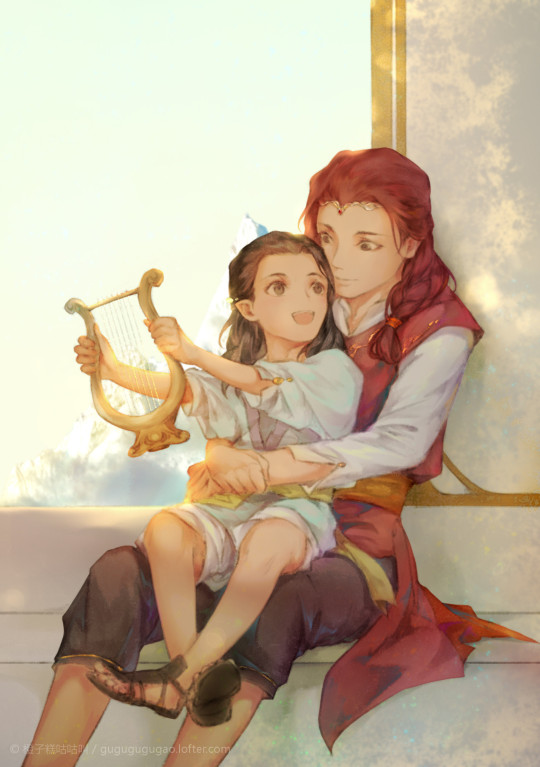
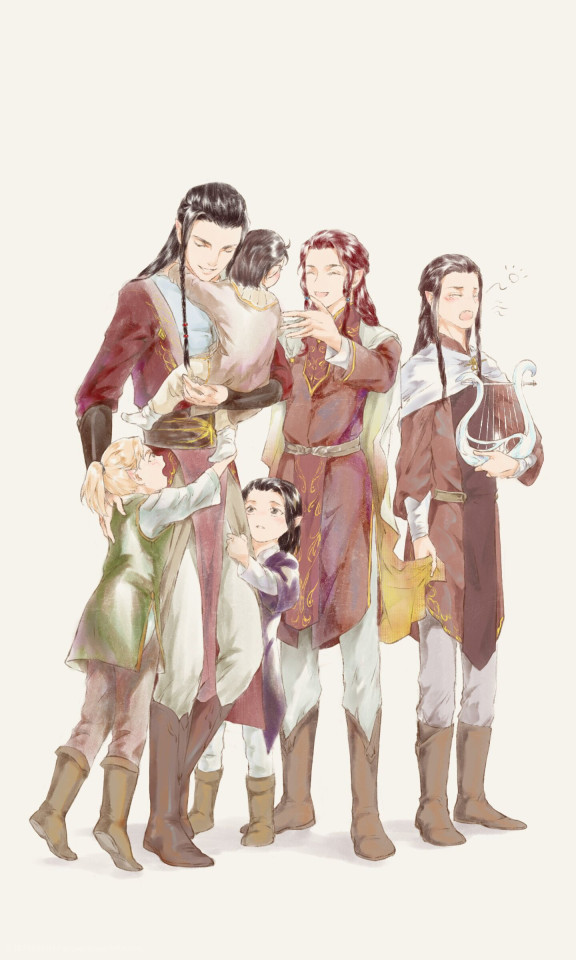
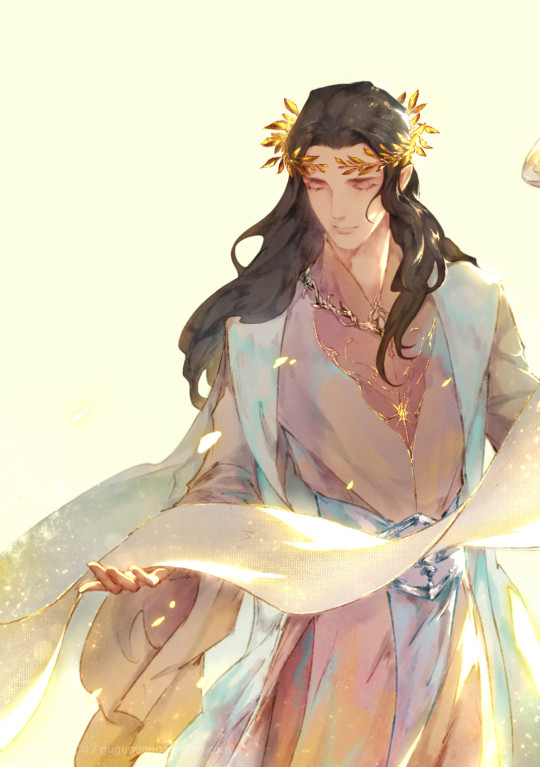
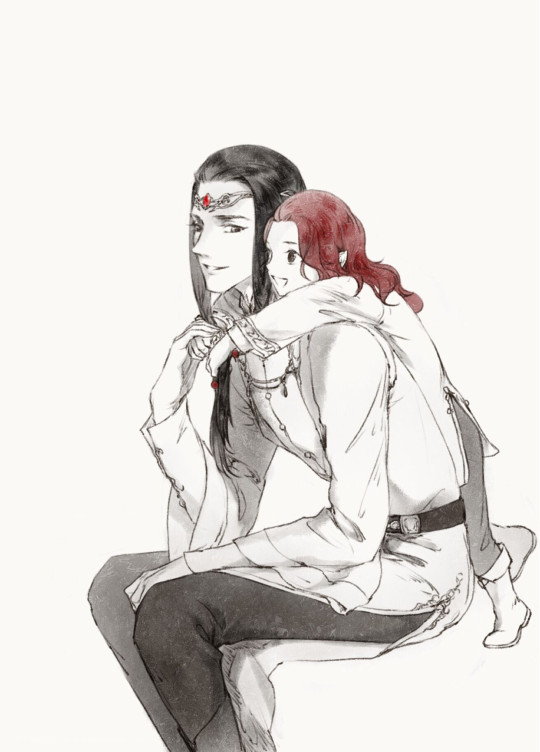
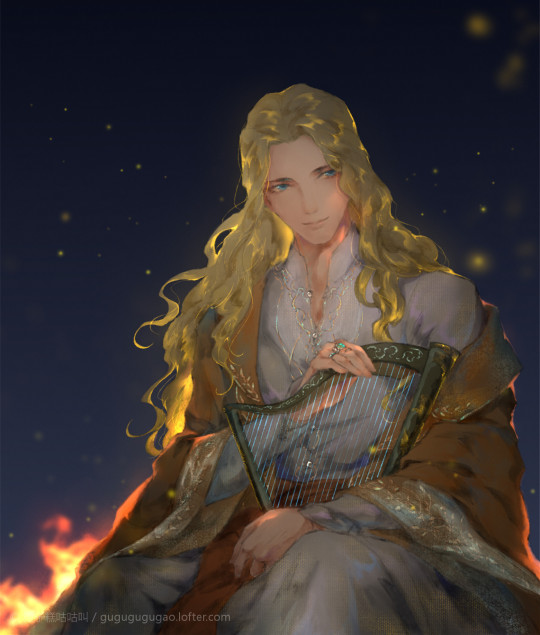
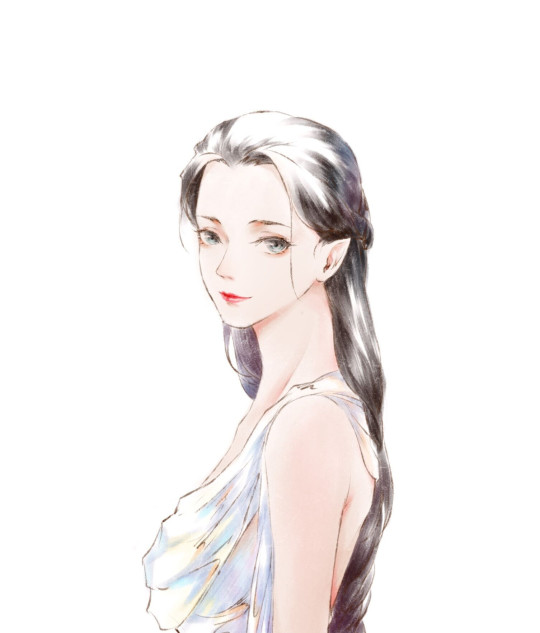
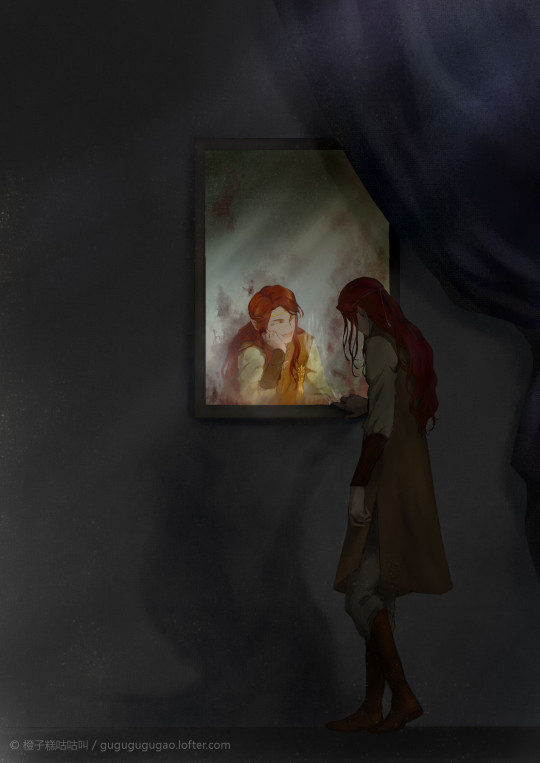


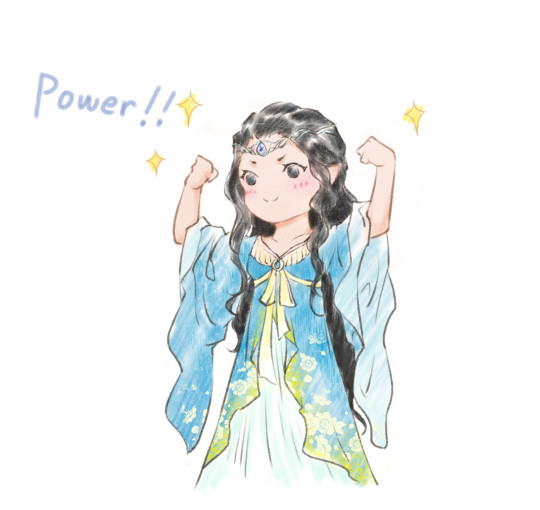
LEGENDARIUM by https://gugugugugao.lofter.com
1. Maedhros & little Maglor
2. Feanor & his sons
3. Maglor
4. Feanor & Maedhros
5. Finrod
6. Aredhel
7. Amras & Amrod
8. Maeglin
9. Finarfin & Earwen
+ bonus - womanpower Luthien ^_^
2K notes
·
View notes
Text

I wanted to draw Aredhel in full armor, then realized armors are not very practical if you are an archer and ended up going for a lazy mix. She wears archery gloves and arm guards in both hands since I read once that elves are ambidextrous and I don't know if that was canon or headcanon, but it's canon to me now. Also, the feathers on the arrows are from barn owls, which I somehow asociate with her.
1K notes
·
View notes
Text
Rebirthed!Maedhros AU
The previous post was getting long enough to be cumbersome, so we’re starting fresh.
Presenting; Part 8! Utúlië lómë
Findekáno’s funeral is a tense, shellshocked affair
Naturally, the entire family attends. Ruining all previous efforts to evacuate them
Maitimo cannot look his aunt and uncle in the eye; it was his idea to run back to Tirion
It’s alright if they blame him. He blames himself too
Fëanáro furiously checks and rechecks the stained glass windows, looking for proof they were tampered with
After the fifth time, Ñolofinwë takes a hammer to the broken window until not one shard of glass remains in it
Anairë takes a bigger hammer to each and every stone in the receiving hall touched by her son’s blood until only rubble remained, forcing Finwë to order new flooring
The sight of Findekáno bristling and bloody from glass shards is one that will haunt them all for a long, long time
Maitimo drifts about as one hollowed out, thoughts and emotions trickling out of him like sand through cracks. He, Angaráto, and Aikanáro attempt to find some solace in each other’s company, but in truth Findekáno was their strongest bridge, without whom a chasm seems to gape between them
He wanders Tirion instead, unable to bear company, not knowing what he’s looking for
(That is a lie, he knows exactly what he’s looking for)
He admits it’s a lie when he finds Melkor in the smithy district and the drought-stricken, hollow places in himself flood with rage. Such wrath as he has never known, he snatches up a finished knife from a smith’s stall and attempts to drive it through Melkor’s heart right then and there
The confrontation is unspeakably public
It takes three people to restrain him
News gets back to Manwë
A trial is called at Máhanaxar
It is every nightmare Maitimo knew it would be
Keep reading
204 notes
·
View notes
Text
the fairest stars
What if Angrist was a little tougher, and Beren and Lúthien managed to steal two Silmarils from Morgoth instead of one? Somehow I’ve already written NINE parts of this unhinged bullet point AU here and decided it was time for a fresh post to avoid that one getting too long.
Where we left off: Lúthien has been negotiating with Mandos like a pro, Maglor is nearly-but-not-quite-dead in Menegroth, Thingol has taken one Silmaril from him, Fingon has the other Silmaril and ditched Curufin outside the Girdle even though they did some bonding on the Worst Road Trip, and people are still upset about Celegorm’s death. YES I am well aware that the pipeline from the fairly normal first sentence of the post to this mess is insane.
Fingon and Maedhros are both very, very good tacticians. Between them, it isn’t very difficult for Fingon to follow Maedhros’ directions towards Menegroth, and then to find the hidden pathways by which Huan led Maedhros out of Thingol’s halls.
It helps that Thingol is still under the impression that the Girdle is impenetrable with the aid of his Silmaril, so he doesn’t have anyone keeping an eye out for the High King of the Noldor sneaking into his realm on an Adventure.
Finding Maglor's sickroom/prison cell/whatever is a little trickier, but not impossible. Long ago in Tirion Fingon was a mischievous child, so he's well aware that the best way not to get caught sneaking into a forbidden place is to make it perfectly clear that you belong there.
He strides confidently down the corridors, silently reciting Maedhros' directions to himself. Nobody stops him.
He's hoping that Curufin was wrong, and he'll know Maglor's door by the holy light showing through the cracks; but when none is evident he's forced to take his chances and start trying doors in the area Maedhros indicated at random.
Since he has plot armour is very lucky with this whole improbable-rescue thing he comes across Maglor without any trouble.
Maglor is only half-conscious – quite apart from the wounded leg, he hasn’t eaten in days – but his eyes flicker open when Fingon comes in.
“Hello, Makalaurë,” Fingon says, deliberately cheerful. “I’ve come to take you home.”
“You can’t do that,” Maglor says dazedly. “It burned – in the Bragollach – remember?”
Fingon opts not to answer that. “Russo said you were healing when he left,” he says instead, frowning at the bloodstained bandages around Maglor’s leg. “What happened? Has Thingol been mistreating you? I thought Lúthien at least was kind!”
Maybe he was too hasty in leaving Curufin outside the Girdle.
Maglor hurries to explain that Lúthien is dead, and that he’s actually in this pathetic state by choice or something.
“Right,” says Fingon, “well, you’re coming back to Himring now.”
But Maglor shakes his head. “I can’t, Finno,” he says. “Thingol took the Silmaril from me. I don’t – I’ve been trying to hold it back. The Oath. But I can’t leave it in Doriath and go, I can’t. So you’ll have to leave me behind.” He manages a brave and tragic smile.
On Thangorodrim while Fingon was struggling futilely with Morgoth’s iron shackle, hopeless tears running down his face, Maedhros said, You’ll never be able to free me, Finno, just kill me, please—
Fingon is rather sick of Fëanorian melodrama.
“One step ahead of you,” he says brightly, and he produces Maedhros’ Silmaril from its box, handing it to Maglor before his Oath can stir at the sight of it. “Here it is.”
This would never normally work. But Maglor is very tired and ill, and not thinking as clearly as he otherwise would.
As long as the obvious question doesn’t occur to him until they get outside the Girdle again—
Maglor takes the jewel and gives a relieved little sigh as the bite of the Oath eases. “You really took it from Thingol?”
“Of course,” Fingon lies. “Let’s put it back in the box for now so that it doesn’t attract too much attention?”
Maglor acquiesces. He and Fingon aren’t close exactly, but they get on well – certainly far better than Fingon does with Curufin. There’s an odd shared camaraderie that comes from loving Maedhros; it lends itself well to cooperation in difficult circumstances.
Fingon picks Maglor up – he's alarmingly light – and they begin to make their way back out of Menegroth.
"You're to be my betrothal gift," Fingon tells Maglor, and Maglor actually laughs.
Unfortunately it's much harder to look innocuous when you're carrying someone about five minutes away from expiring on the spot.
They haven't got very far before an angry voice comes from behind them: "Who are you and where are you going with the Fëanorion?"
Damn.
Meanwhile
[I should clarify my definition of "meanwhile" here. Evidently time runs much slower in Aman than it does in Middle-earth, even post-Darkening, or it's difficult to fathom why Beren and Lúthien canonically took two years to return from death. In vague support of this, the Fellowship find that time runs slowly in Lothlórien, presumably with the aid of Galadriel's ring, so I posit that the more Divine Stuff there is near a place (and Galadriel was ofc a student of Melian too), the more weird time shit occurs. So since I've anyway fudged the timelines so that travel times work out conveniently, we can also put the bits of story occurring in Aman here for funsies.]
Meanwhile, Finrod has been following Celegorm around in the Halls of Mandos.
"Was it worth it?" he asks. "Did you take joy in the lordship of Nargothrond, once I was gone?"
"I could ask you the same," says Celegorm, responding for the first time. "Did you die for anything in the end, Ingoldo? The mortal's here, after all your efforts. So much for your oath."
"So much for yours," says Finrod; "it looks like that eternal darkness you doomed yourself to wasn't that dark. Or eternal. So what was it all for? Do you even regret any of it?"
The dead can't lie. Artifice and deception are matters of the flesh, and they are buried with it.
"I didn't want you to die," Celegorm says.
"Well, that's a start!" says Finrod. "I can't say I'm glad to see you here, either."
"O Fair and Faithful one," says Celegorm, "spare me none of your pity. They are already whispering that you will be released soon, first of all the Exiles to walk again in Aman. So it's all turned out rather well for you, despite your evil cousins' machinations."
"I suppose it has," says Finrod, thinking.
The thing is, it was worth it. Beren's life mattered. It mattered that he saved it, even if he died to do so, even if Beren is dead now too (although word is that might be changing).
He did not do it expecting a reward.
"And my werewolf was bigger than yours," says Celegorm.
Finrod rolls his metaphorical eyes. "At least I actually killed mine."
Cousinly bickering is still kind of fun, even when you're dead.
Curufin, fuming outside the Girdle, would not agree.
After a time he's forced to conclude that the only thing he can do is head back to Himring.
The ride through Himlad, once as green and fair a land as any, does not improve his mood.
Also his burned hand is still hurting.
Look: here's the little stream where Celegorm caught a huge fish once; and here are the low hills where, a couple of centuries ago, they held some war games and Curufin's people thrashed Celegorm's decisively.
Here's the copse where, years before the Dagor Aglareb brought tentative peace to East Beleriand, Curufin and his son were surprised by a party of orcs, who took their small patrol all captive.
Tyelpë was just barely of age at the time. How trusting his eyes, then, how baby-soft his hair: how easily he had believed that his father would fix everything.
As for Curufin, he spent the hours-long ordeal learning anew what terror was, rendered compliant by the mere possibility that they could hurt his child.
They were fine, in the end. Celegorm rode up to the rescue while the orcs were still quarrelling over where to take them.
But Curufin remembers: how disabling love can be.
Meanwhile Fingon finds himself surrounded by a crowd of angry Iathrim in their home city.
He sets Maglor down on the floor and sets a hand on his sword-hilt, wondering if he is about to become a Kinslayer again.
(Fingon regrets Alqualondë more than anything; and he'd do it again, for Maedhros' sake. He knows this about himself.)
Before things escalate too far, Thingol shows up at the scene of the disturbance.
"We haven't met," Fingon says. "Fingon son of Fingolfin, High King of the Noldor in Beleriand. I've come for my cousin." He gives Thingol a rather dangerous smile.
Thingol thinks he might be in serious trouble. He attempts to adopt a conciliatory tone (which is really really hard for Thingol ok he's trying).
"He'll die if he's moved," he says, nodding to where Maglor is slumped against the wall, shivering.
"He'll die if he stays here!" Fingon says. "Is this the famed hospitality of your halls?"
"He has been offered every treatment he could ask for," Thingol says. "It is not the fault of Menegroth if he chooses to refuse them. Now tell me, son of Fingolfin, how came you through the Girdle of Melian – without her leave or mine?"
Maglor puts the pieces together. "Finno, you lied to me," he breathes, glancing at the box in Fingon's hand.
Fingon wonders if it would be diplomatically insensitive to kick Thingol.
"The jewel alone does not explain it," Thingol insists. "While I hold the Silmaril my daughter won, surely—?"
"I could have told you that, had you asked," says Maglor. "Silmarils aren't weapons! You can't use one as some sort of military defence."
Thingol is now questioning all his life choices.
He only took the Silmaril from Maglor in the first place because he thought it would protect his kingdom, and now—
Maglor is feeling resigned. He should have known Fingon's claim was too good to be true. Thingol still has the Silmaril, and Maglor can't leave Menegroth without it.
Face pale and set, he attempts to get to his feet, mostly unsuccessfully.
Fingon looks down at him. "Seriously, Makalaurë?" And when Maglor ignores him, he says, "Sorry about this," and kicks Maglor's bad leg – carefully, but still hard enough to hurt.
Maglor faints.
Fingon picks his limp body up. "The Silmaril isn't yours," he tells Thingol.
"The white ships of Olwë my brother's people were not yours, either," Thingol returns.
Fingon inclines his head, acknowledging the point. "I don't wish to start a war over the Silmaril," he says. Maglor is so cold and still in his arms. "My cousins have done enough for that cause lately. Only let me take my kinsman home."
Thingol hesitates. The iron box in Fingon's hand is so close, and Fingon is outnumbered, and he has his injured cousin to worry about—
It could all be over, if he took the second Silmaril. He'd never need to worry about his people's safety from invasion again.
"Elu," comes a voice from behind him, "enough of this. Let them go."
"Queen Melian," says Fingon, bowing his head.
She barely looks at him, meeting her husband's gaze instead. "Time and again you have disregarded me," she says. "Lúthien is lost, and yet you persist with this. Will you heed me now?"
Thingol stares at her, and then, finally, he waves his hand. The bristling guards move aside, allowing Fingon free passage down the corridor.
"I trust you can remember your way out," Thingol tells Fingon, and turns away.
Fingon looks at Melian. "Thank you," he says, "and I am very sorry about your daughter."
He has met Maiar before, of course, in Valinor: but Melian is still unsettling, with her implausibly flawless face and eyes that hold yet the memory of a time before Time.
"Little king," she says, "only hope that you will not know any such pain yourself."
Fingon manages a smile. "I'm good at that," he says. "Hope."
On that note he leaves Menegroth, carrying Maglor, and begins to make the long trek back through the Forest of Region, and thence to Himring.
Curufin has managed the journey significantly more quickly. On a crisp cold morning he rides back through Himring's gates.
Maedhros has been... managing. Not well, but he trusts Fingon.
Beloved, I will bring them back to you. Beloved, I will bring them back to you. Beloved, I will bring them back to you.
But here's Curufin by himself, looking pale and tired, and after all it was only a hastily-scribbled note, not an incantation.
Maedhros arrives at the gate at a run.
Scarce weeks ago it was the other way around, Maedhros riding into the fortress with Fingon's cloak only just concealing his bloodstained clothes: and Curufin met him as he came in and he can still feel the terrible jolt of knowledge in his stomach, and Celegorm is still dead.
How can it be borne?
A thought comes to Curufin and for a moment he thinks it the cruellest idea he has ever had, but Celegorm is dead and his hand is still burned and nobody expects any better of him anyway.
"They're dead," he says flatly, "they're both dead," and Maedhros just – stares at him.
(to be continued)
349 notes
·
View notes
Text
Did this need testing? No!
Was I surprised by the result? For sure!
12K notes
·
View notes
Text
Character Thoughts - Aredhel
She’s the youngest in her family, and a little petted and overprotected. She loves spending time with her cousins, where she can be adventurous and laugh at danger, and Fëanor’s words about Middle-earth, a wide and wild land free of contraint, pull at her heart. She doesn’t share his hostility to the Valar, exactly - her feelings about the Valar are much like her feelings towards her family - kind and loving and endlessly helpful, but oh, so stifling in their care. She doesn’t want to rule, as Fingon and Galadriel do - she shuns any kind of true responsibility - she only wants to be untethered, free of any kind of constraint, to face true danger and overcome it.
The Return sets her afire, a time of shock and horror and yet of transformation, a time when her actions and choices matter as they never have before. She throws herself into battle to rescue her cousins without a second thought, and in the years after tries not to wonder if her father led the host over the Helcaraxë in part because he feared to subject his little daughter to the Valars’ judgement.
By the time they arrive is Hithlum she’s angrier at the Fëanorians than she’s ever been at anyone in her life. She tells herself she hates them, but she still bakes lembas for Fingon to take to Maedhros after he’s rescued, when Galadriel flat-out refuses. (Aredhel’s not very good at lembas.)
On a scouting mission outside the camp, Celegorm finds her. She shoots a half dozen arrows at him and he catches them out of the air, laughing. Huan is with him and gives her a massive canine hug, and she has to stop herself from smiling. She tells herself she hates him. But Celegorm can be very charming when he wishes, and she can’t seem to stop running into him, and after she’s recounted the story of her defeat of an ice bear fifteen times and he’s made approving noises and admiring exclamations at all the right points, things are almost back to normal between them. She can’t hate him. He’s her best friend, the one person who never said Be sensible, Aredhel. Be responsible, Aredhel. Think before you act, Aredhel.
But responsibility comes, inevitably. In the later years, she spends a lot of time with Idril, who still wakes up in the night calling for her mother. Until the Ice, no one had ever needed Aredhel before; now that they do, she can’t turn away. When the Fëanorians depart for East Beleriand, Celegorm tells her to come with them. “We left Valinor for freedom,” he says, “yet here you are, still hemmed in by mountains and brothers.” She can’t explain. Can’t tell him that she needs to stay with Turgon and Idril; can’t tell him that Turgon hasn’t smiled since Elenwë’s death, that Idril is too quiet and detached for a child of her age, as if a part of her were missing. To Celegorm’s mind, the matter was settled when Maedhros gave up the crown, and even that was a rather excessive gesture; for people to continue to mention the Ice afterwards, to continue to be harmed by it, would be entirely ungracious and resentful. Anything she could say would land as an accusation.
So she stays with Turgon, and goes to Gondolin when it is built, and spends her days exploring the Echoriath as her son later will. The city is as beautiful as Turgon dreamed; a vision of Tirion in Valinor.
She crossed the world to get away from Tirion.
189 notes
·
View notes
Text
Maedhros: I don’t have emotions
Narrator: He did in fact have many emotions
Caranthir: Well, I hate you all
Narrator: He did not in fact hate anyone
Celegorm and Curufin: We have a great idea
Narrator: They did not ever in fact have any great ideas
Maedhros: (sigh) Maglor can you stop singing commentaries from the balcony
Maglor: The great minstrel of the Nolder would not in fact be silenced
812 notes
·
View notes
Text
Hi hello neurodivergent people who love clicky button, i am a neurodivergent person and I am interested in what kind of hyperfixations are most common! If you have multiple current hyperfixations (me too), choose the main one!
if you are willing to please reblog so I can reach more neurodivergent people and get more interesting results!
14K notes
·
View notes